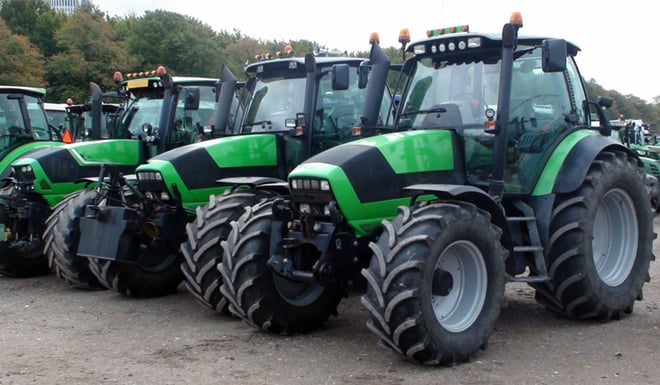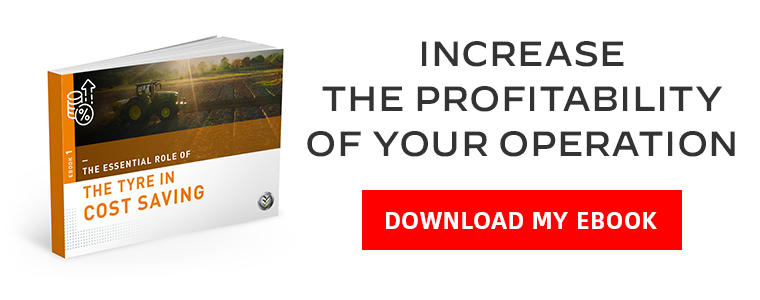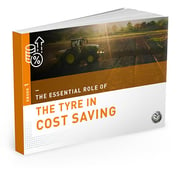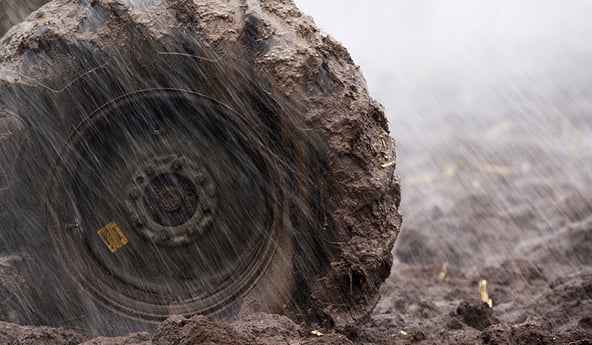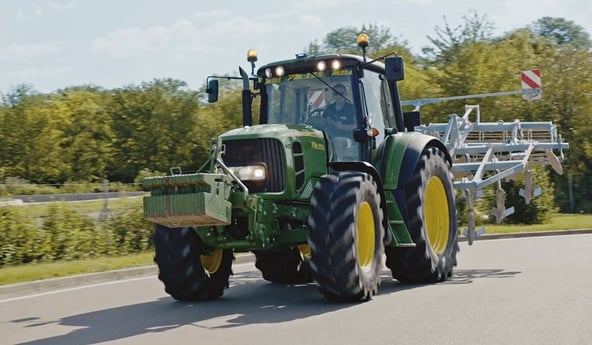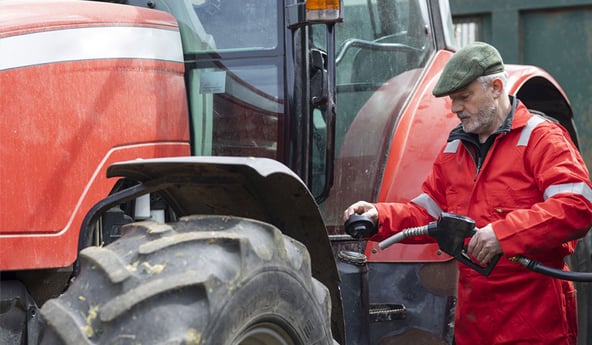Making your operators more aware of good tyre management practices may seem secondary, but the role of the tyre is much more important than you imagine for successful operations in the fields.
This is the reason why a minimum amount of team training is necessary to control your tyre budget and make considerable savings by reducing tyre replacements linked to wear, by reducing fuel consumption and saving time with better traction, and by preserving your clients’ land against excessive soil compaction.
In this article, we present the arguments that you can use to encourage your teams to manage tyres better, for everyone’s benefit.
1. Training agricultural contracting company teams in tyre management
Tyres represent a major budget item and good knowledge of the equipment and the ability to keep wear in check depends on the level of user knowledge and can help make considerable savings each year.
The rate at which you have to replace tyres depends directly on how well trained your teams are.
There are many benefits to be gained from training your teams on any technical or agronomic aspect.
Training helps improve team bonding in agricultural contracting companies, it reinforces the feeling of belonging to a group, often leading to more dedication and investment on the part of operators as well as pride in belonging to a firm that allows them to reach a higher level of proficiency.
Why train your teams
- Training is an excellent way of motivating staff and enabling them to build up their skills.
- The additional qualification will allow you to commend your operators to clients in a competitive market.
- For the same price, people will always prefer to work with agricultural contracting firms who have the most qualified personnel, as it’s always reassuring for the client to know that he is entrusting his operations to an experienced worker.
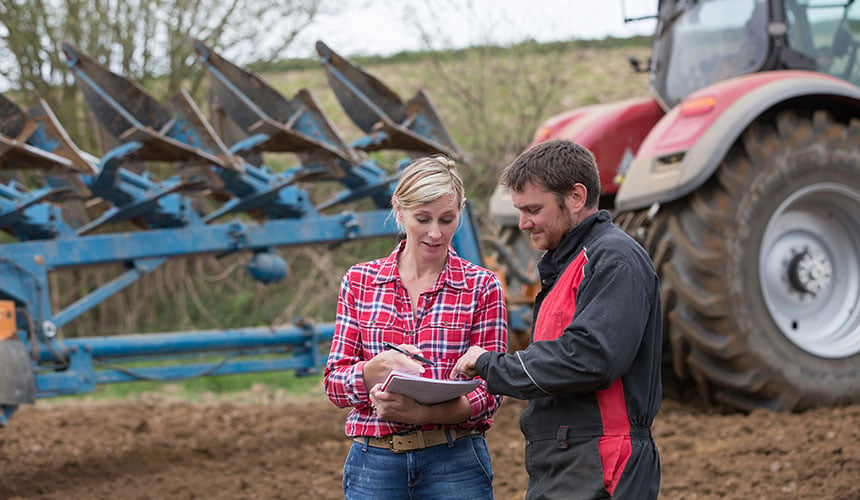 A more qualified operator
A more qualified operator
for good relations with the client
Your training actions may result in the transmission of economic notions that are important for the longevity of the agricultural contracting company, such as taking good care of the equipment.
They allow everyone to be more involved in maintenance and more attentive to preserving their working tools.
The benefits of good operator training
- The equipment is costly and trust is necessary to hand over a combination vehicle (tractor + trailer or implement) to an operator. This also involves a considerable responsibility for the operator. The higher the level of training, the more the stakeholders are mutually reassured as to the correct use and preservation of this equipment.
- When working on site for the client, the operator is often alone in the tractor and has to make decisions alone to ensure that the service is carried out correctly in all circumstances. Operators must be capable of identifying solutions to the problems they encounter. Better training leads to more self-sufficiency for a better management of all situations.
How to set in place optimal training
A very good solution for obtaining quality training on tyres is to invite a tyre manufacturer’s technical experts.
Calling in a tyre specialist for a rapid training session will provide you with excellent advice free of charge. It will give more real value to the teams as well as better knowledge of the different possibilities of agricultural tyres.
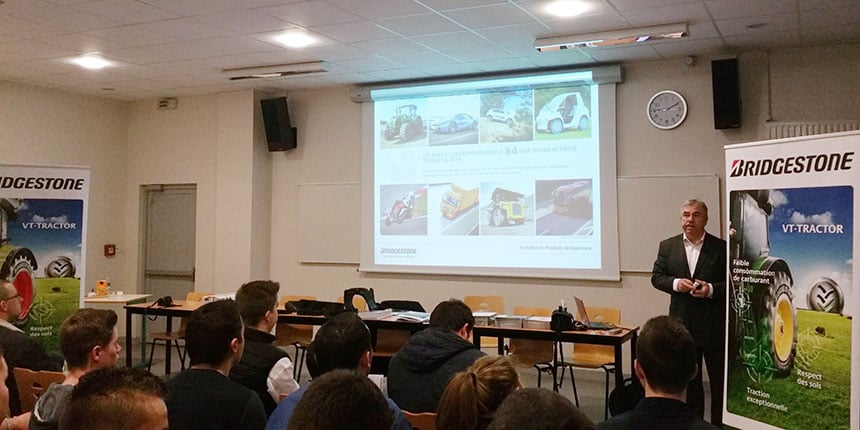 Agricultural contracting company
Agricultural contracting company
training organised by Bridgestone
2. The key arguments to obtain better tyre management
Gain time on a daily basis
Using the right pressure settings depending on the load results in better productivity.
When working in the fields, reducing pressure as much as possible (within the limit permitted by your category of tyre) is the best way to improve traction, reduce rolling resistance and slip while limiting soil compaction.
With lower pressure, the tyre has a larger soil footprint, traction improves and over an area of several hectares, you will have saved an hour by the end of the day.
Avoid breakdowns and damage
Damage to the tyres is often avoidable, because it is generally linked to intensive use, and in most cases the damage is progressive.
- For example: a small hernia on the sidewall, a deep cut, even just a small one, wear on just one part of the tyre, corrosion of the wheel bolts…
All signs which, if they are spotted in time, can help prevent a breakdown during operations which would immobilise your tractor for several hours. This would lead to emergency breakdown services and the related costs and in the end the client will not be very satisfied as operations will come to a standstill.
A simple regular check-up is often enough to detect a problem. Just like an aircraft pilot with his check list before each flight to anticipate any problems, an agricultural operator can get into the habit of carrying out a set of rapid checks which will improve the reliability of the services and often avoid more complex and costly problems.
Improve skills
The possibility of learning more about agricultural tyres allows the operator to improve his skillset, to adapt to highly specific technological developments in part of the agricultural sector.
Training improves the operator’s capacity to adapt as well as the quality of the work carried out. When you have a better understanding of the role of the tyre, you manage slip, wear and fuel consumption better and you know how to optimise traction to save time.
3. The essential adjustments and check-up points for tractor tyres
Before starting operations, a series of good tyre check-up and maintenance practices can be implemented which will help preserve the company’s equipment.
Certain adjustments and checks are essential because without them the tyres may undergo serious damage which could lead to premature replacement.
10 check-up points which take a few minutes
Ask your teams to follow this check-up routine which will avoid numerous problems and may save you many hours of use of your tyres:
1. Is there any mark or anomaly on the tyre?
A rapid visual inspection of the sidewalls and tread will reveal any cuts, hernia or traces of an impact on the tyre.
2. Is there any mark or anomaly on the rim?
A rapid check around the rim, above all at the level of the tyre’s bead seat, will help avoid damag.
3. Is there corrosion at the level of the bolts?
Check the presence or progression of corrosion on the rims and more specifically on the wheel bolts.
4. Is the valve cap missing?
The valve is the weak point which permits the flow of air and may be the cause of a loss of airtightness following a minor knock. The cap is what protects this weak point.
5. Are there foreign bodies present?
The presence of foreign bodies at the level of the bead may cause damage linked to the permanent flexion and deflexion of the tyre when driving.
6. Is there irregular wear to the lugs?
When you notice irregular wear at the level of the lugs, in most cases this is a sign of incorrect parallelism.
7. Are your tyres over or underinflated?
Checking tyre pressure is vital and obligatory if you want your tyres to resist the load and allow you to work in the best possible conditions.
8. Are there abnormal vibrations when you drive?
Vibrations when driving are often the result of incorrect parallelism which will cause the rapid deterioration of your agricultural tyres.
9. Is there a problem with directional stability?
Just like abnormal vibrations when driving, a problem with directional stability is often caused by an error in parallelism.
10. Is there any sway or abnormal bouncing?
A left/right sway effect when driving may be linked to several causes, but the most frequent are tyre mounting errors, or a tyre or rim which is not perfectly round.
The right tyre pressure settings
Managing tyre pressure is often difficult because the inflation pressure depends on the load (to compensate for the weight of the tools), the activity carried out, with high or low torque, speed (to avoid overheating) and the type of land (hard or soft soil).
Depending on the pressure settings you may have either optimal efficiency if the pressure is perfectly adapted and the total weight is well distributed (30%/40% at the front and 60/70% at the rear) or deteriorated working conditions if the pressure is not suitable. Here are the two most frequent examples:
- If the tyres are underinflated and you drive frequently on the road, you will increase your fuel consumption and reduce the stability of the trailer when braking and cornering. Your tyre will tend to wear more rapidly, on average with a 25% shorter lifespan.
In addition, if pressure is really too low on the road, this will encourage overheating of the rubber components and metal elements of the tyre and may result in the tyre bursting. - On the other hand, if inflation pressure is too high, this leads to other problems in the fields, such as soil compaction, an increase in rolling resistance, more slip. Beyond a slip ratio of 15%, there will be horizontal sliding of the upper layers of soil which deteriorates its structure.
In addition, the actual distance travelled by the trye is much further than the distance travelled by the tractor. This results in excess fuel consumption as well as premature wear to the tyres.
Slip is often linked to incorrect inflation pressure
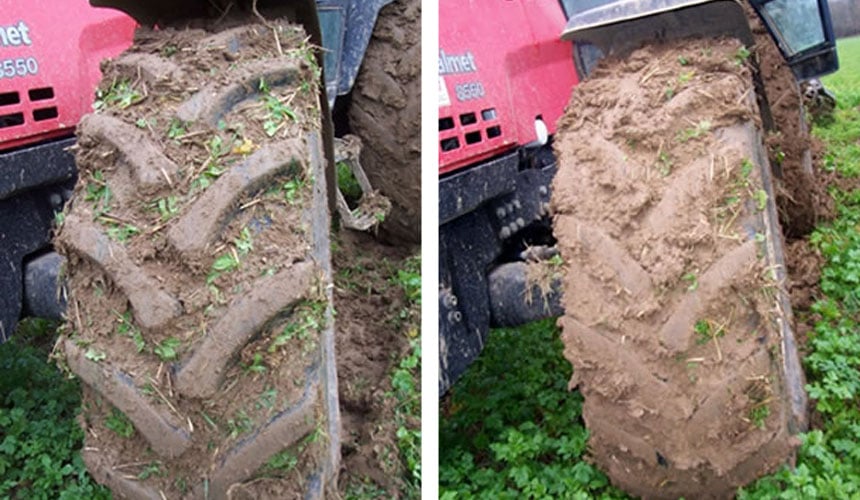 Change in tyre pressure test in the same field,
Change in tyre pressure test in the same field,
on the left 1 bar = no slip,
on the right 1.25 bar = excessive slip.
4. The benefits for everyone of better agricultural tyre management
The benefits for the operator
Tyres that are always at the right inflation pressure mean better traction and less slip, so for the operator the job will be finished more quickly.
If you improve the level of your knowledge, you will naturally improve the quality of your work, leading to the possibility of more recognition and gratitude from the client at the end of the operation.
The benefits for agricultural contracting companies
The value that the agricultural contracting company brings to its clients is based on rapid work that is carried out perfectly while preserving the soil in the fields.
Furthermore, if the operator knows how to explain why his work is good quality: working at a low inflation pressure leads to better traction, working faster while avoiding compaction, which protects the quality of future yields in the field. A real differentiating point compared to your competitors.
Pressure that is optimised based on load and speed and soil means that the rubber will wear less quickly, giving you thousands more hours of use before having to replace your tyres. The savings will be significant in the long term with sets of tyres that last much longer.
The benefits for the client
For clients, quality work is always appreciated, above all if your equipment is more high-tech than theirs (VF tyres or CTIS).
Many studies have shown that the loss of yield as a result of compaction can represent up to 20% (even as much as 50% depending on the crop and the extent of the compaction). This is even more pertinent if the work is carried out in wet conditions, such as harvesting work in the Autumn (corn and sunflower) and also during stubble ploughing and preparation (tilling and sowing).
 Quality work for a satisfied client
Quality work for a satisfied client
Regular check-ups will optimise your equipment, as well as the time spent on operations. The team will adopt good habits and appropriate good techniques, naturally leading to a general improvement in the quality of their work.
To transmit the idea to your operators,
you can teach them the following catch phrase:
”A minor adjustment is better than major repairs”
The Bridgestone-agriculture.eu blog is written and administered by tractor tyre experts who are available to provide you with the advice you need on the subject of your agricultural tyres. They allow you to maximise your productivity with information on all subjects linked to tyres: Cheap tractor tyres — Technical data for agricultural tyres — Air pressure advice — Solutions to avoid soil compaction — Sprayer tyre pressure — Why and how to ballast your tractor tyres — When to use dual wheels — The mechanical causes of abnormal wear — Cheap agricultural tyres – etc…
To learn more and boost your farm's profits, Bridgestone-Agriculture is offering you a free, detailed white paper that explains the essential role your agricultural tyres play in your productivity.
Most people who read this article have also read some of the following articles:
- 5 essential techniques to optimise your agricultural tyres
- How your agricultural tyre footprint can help you detect a problem
- Manage your pressure to the ground to make your agricultural tyres last longer
- Dual mounting the best solution for optimal productivity
- Which agricultural tyres improve the tractive force of your tractor?
- Tractor tyres are crucial for successful ploughing
- How best to use your tractor tyres: wide or dual tyres
- Use forestry tyres for more resistence and motricity
- How your agricultural tyre footprint can help you detect a problem
- How to adjust wheel alignment and avoid wearing out my tractor tyres
- How your tractor tyres affect your fuel expenses
- Why your tyres’ speed index is primordial
This information is intended only to make you aware of the technical and functional aspects of agricultural tires and their use. It does not allow you to make a judgment or a definitive conclusion on a given problem. Only your agricultural tire expert is able to make a technical assessment and take a final decision, case by case.
Leave a
commentary
Your email address will not be published.
Required fields are indicated with *


